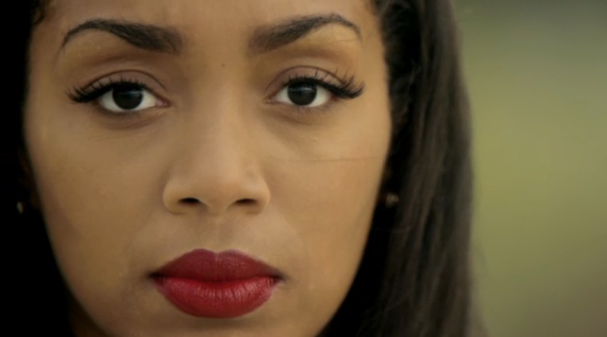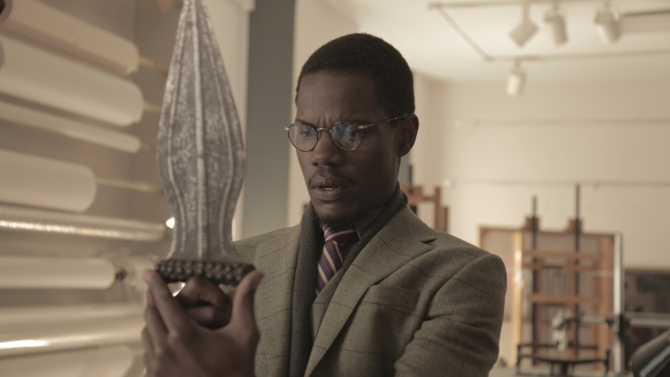MOVIE REVIEWS |
INTERVIEWS |
YOUTUBE |
NEWS
|
EDITORIALS | EVENTS |
AUDIO |
ESSAYS |
ARCHIVES |
CONTACT
|
PHOTOS |
COMING SOON|
EXAMINER.COM FILM ARTICLES
||HOME


Tuesday, February 17, 2015
MOVIE REVIEW Da Sweet Blood Of Jesus
The Eve Of Origin And Afterlife

Zaraah
Abrahams as Ganja Hightower in Spike Lee's thriller "Da Sweet Blood Of Jesus".
Gracias Ventures
by
Omar P.L. Moore/PopcornReel.com
 FOLLOW
FOLLOW
Tuesday,
February 17,
2015
Even if you saw Bill Gunn's startling, powerful "Ganja & Hess" forty years ago,
the devastating Spike Lee art thriller it inspires, "Da Sweet Blood Of Jesus",
unsettles and reverberates. On the surface unremarkable this quiet,
"official Spike Lee Joint" is an intense, definitive entry in Mr. Lee's canon.
The film alternates between colorless views of Brooklyn's Red Hook projects and
a stunning Eden-like Martha's Vineyard superbly shot by cinematographer Daniel
Patterson. The layers of this rich, decorous feast of gore and
thought-provocation are eye-popping splendor.
"Da Sweet Blood" is an austere, incisive metaphoric cautionary tale of
capitalist society, art, faith, Black women, masculinity and the ravaging of
people for a rebirth via afterlife. Blood in, blood out. Way
out. As the title suggests: you'll see plenty of red but "Da Sweet Blood
Of Jesus" isn't a horror film. It's a spirit vs. matter battle ala Cain
and Abel. The Lil' Piece of Heaven Baptist Church is a key player, and
Bishop Enoch, head of that church in Mr. Lee's 2012
"Red Hook Summer" has, we're
told at the start, "recently departed". Enoch left but has he passed?
"Da Sweet Blood" is expressly about transitions.
The studious Dr. Hess Greene (Stephen Tyrone Williams), whose mild Bahamian
accent recalls Sidney Poitier, transitions to "undead" after he's stabbed with a
"cursed" ancient Ashanti artifact by troubled Brooklyn Museum assistant
Lafayette Hightower (Elvis Nolasco). Hours before, in Hess's posh Vineyard
pad the two discuss the Ashanti heritage of Ghana, and blood societies.
Blood is a source of dread, Hightower notes, while Dr. Hess posits that "the
United States Of America is the most violent country in the world." The
Ashanti, he adds, needed blood but saw less value in shedding it. Blood
societies. Wars. Enslavement. Genocide.
In this upper-middle class story of power and reparation Hess and Hightower are
a fascinating juxtaposition. Hess is an old-guard figure committed to
researching ancient African tradition while Hightower is swimming uneasily in
present-day American society. The latter has gone insane in an insane land
of excessive work and destructive excess as its misguided payoff. "My
favorite Spinners song is 'Mighty Love,'" Hess proclaims, after telling a
disillusioned Hightower that "all that glitters is not gold." Mr. Lee
charts men on different paths, one seeking an end to an end, the other seeking
something more than the end of life.
Neither argument made about blood is wrong. Blood is often associated with
death but essential to preserving life. We give blood at blood banks to
save others' lives. In the Christian faith Jesus Christ's sacrifice on the
cross gave life. (A Lil' Piece Of Heaven church banner unapologetically
reads JESUS SAVES.) A woman's menstrual cycle signals the beginning of
ovulation. A process in the potential start of life.
This life of blood clashes with societal perversions of blood and violence and
its meaning in American media culture as capitalist sell point: "if it bleeds it
leads"; a blood fetish (in some audiences attending horror films); "first blood
drawn" in a boxing match. The Hightower idea says blood is cherished for a
selfish "death culture" end: capital gain, not corporeal replenishment, Hess's
belief, as viewed through the Ashanti faith and people, who valued blood highly.
In "Da Sweet Blood" giving blood and taking lives is a public service for the
benefit of the soon-to-be-deceased, not a private curse. The blood
addiction Dr. Hess has takes extraordinarily comic turns at times, a much-needed
relief from the heavy force of Mr. Lee's intrepidly independent film. The
film's motifs are rich in Ashanti tradition and art beautifully punctuating the
film's mood, philosophy and rectitude. The art and the stately, refined
scenery it augments belies the brutality and cool that furiously swirls in this
deliberately-paced effort.
The distance and remoteness of the atmospheres Mr. Lee captures makes "Da Sweet
Blood" seem sleepy but this percolating film slips effortlessly from inaudible
conversation via the trance-like Dr. Hess to jolting, striking visions including
a tree robust enough for "Strange Fruit" lament. The tree is a hallmark of
an American method of violence by which some characters either emulate or
attempt to exit a crazy, violent society.
The symbolism grows as Mr. Lee looks at the way some Black men have abandoned
responsibility in devaluing Black women (in entertainment and in general.)
"I never loved him anyway," remarks the brutally honest and impatient Ganja
Hightower (Zaraah Abrahams) of her ex-husband, who it turns out, has misled,
defrauded her and said nasty things about her. Ganja will tell
Hess about forever being bullied by her brothers, and her dad's cold,
non-consoling and unforgiving reply: "Ganja has to take care of Ganja."
Hess is remorseful for his transgressions though we don't always know what they
are. We glimpse some of them, though. A promiscuous man, Hess
"rights" (reordering a poisoned and morally bankrupt human race) by ending
lives. His treatment of Black women comes with deceits for sex, which one
prostitute readily offers him. Another addicted Black woman, a single mother
in Red Hook, invites him "to party", code for drugs, which results in the single
most powerful image juxtaposition I've seen in a film this year or last.
It's an image that suggests something Christ-like or soul-saving about Hess yet
troubling and violating.

Stephen Tyrone Williams as Dr. Hess Greene in Spike Lee's
thriller "Da Sweet Blood Of Jesus".
Gracias Ventures
"Da Sweet Blood" gives its upper middle-class vulture-like leeching power over
the society's lower-classes. The bourgeois class affirms its footing on
the necks of entrepreneurial people, even if trading in all the wrong
businesses. (One conversation on the Vineyard remarks about crime and its
fine demarcations.) Almost all of the blood-letting occurs on the
Vineyard, and all but two of the victims are of the poorer classes.
Some of the seven deadly sins (and addictions) are punished by Hess, a Blood
Avenger: a jealous woman from Hess's past engages in a dance with Ganja, who has
married Hess in full Ashanti ceremony. Mr. Lee's work here, as in more
than a few films that he has adapted from prior works, is far more subtle than
it appears. For all its slightness "Da Sweet Blood" is a dense film which
necessitates at least two viewings. I'm not sure how many will be up for
that challenge. Horror fans may find the film challenging, gore or no
gore.
While upper-class trappings are often a means for indictment, scorn or
observance by Mr. Lee. In "She's Gotta Have It", the pace of rhythm of
which "Da Sweet Blood" strongly resembles (the latter was shot in 16 days,
"She's Gotta" was shot in 12), class mores were mocked by "urban" characters
like Mars Blackmon and others. Middle class sins and adultery were scolded
in Mr. Lee's "Jungle Fever" as the Black family was ravaged by drugs (ala
its Marvin
Gaye metaphor.)
A question I asked myself while watching Mr. Lee's layered film: as a Black man
is Dr. Hess complicit, assimilative to the dominant white patriarchal societal
scheme, in the demise of the Black family? (I've heard a general argument
from some corners that Black men are more susceptible to co-opt the family as a
"low-intensity warfare" if you will.) Hess gets an HIV test, and
it's well-known that
Black women are the heaviest casualties of HIV, women whose husbands and
boyfriends (i.e. in various U.S. cities via the "down-low" culture
profiled in Bill Duke's drama "Cover"),
bring disease home to Black women, that carries with it a
death sentence.
There's mistrust by the Black woman nurse (Joie Lee) treating Hess, who promises
to practice "safer sex." "That's what they all say," the nurse remarks
knowingly. She's seen this movie too. The devastation in the public
service posters on the wall advertise the dangers of HIV. Black women are
prominently featured in the ads. Mr. Lee attacks the instant gratification
and cravings of some characters in his film, whic calmly soaks in the vistas it
presents. There's a mystical and ethereal quality in "Da Sweet Blood"
that's both appealing and undeniable.
Amidst a ravaged America, I ask, is Hess a savior? Is he doing his
"victims" a favor by liberating them from a society of death and a transition to
afterlife or undead state and chance to start over? "I'm tired of living
this life," Hess explains shortly before retiring to a greater place of purpose.
(Blood-sucking is exhausting. Doesn't it get old?) What remains in a
barren place is a future where responsibility is finely drawn, in a
sparsely-populated new world paradise. "Da Sweet Blood" is a love story at
heart but it's more so a love of life story -- one where love of live and love of
value of people counts.

Zaraah Abrahams as Ganja Hightower in Spike Lee's thriller
"Da Sweet Blood Of Jesus".
Gracias Ventures
Speaking of transitions, Mr. Lee is an artist with a purpose of replenishing and
expanding the life of Black art beyond himself. For years his films
constantly introduce new or emerging talents (Mr. Williams and Ms. Abrahams.)
The film's terrific soundtrack is entirely -- save the fine Brazilian sounds of
Milton Nascimento and Jorge Ben Jor and Siedah Garrett's beautiful and sorrowful
"As We May Dream" -- made up with excellent music from many as-yet-unsigned
artists including Govales
("Doors To Nowhere")
and Dana Hilliard
("All Night").
The characters in "Da Sweet Blood" aren't remotely interesting but Lafayette
Hightower is the film's most relatable, representative character. He's
figuratively living dead, burned out chasing a society's great lie. He's a
casualty of assimilation, blinded by a rapacious fervor and addiction to endless
work (or endless celebrity) and the pitfalls that come with it. It's the
impossible and relentless demand that took the drug-addled life of Whitney
Houston, whom a woman in "Da Sweet Blood" evokes in a scene that starts and ends
near a bathtub.
The same impossible burdens and stress took (the drug-addled final days of)
Michael Jackson (or
Philip Seymour Hoffman), superb artists killed
by addiction but arguably by the insanity of media, paparazzi and "fame"
society. Hightower is a less noted figure of that genus. He's not Princess Diana or
the King Of Pop but he stands uneasily and tragically in their lofty shoes.
Bobbi Kristina Brown is in that very same place right now, in a dire reality
that Twitter, for all its vitriol and instant indictment, can't deny.
Steeped in art and pristine visions, "Da Sweet Blood Of Jesus" references
Michael Jackson in another way in a great opening credits dance number (ala
"Do
The Right Thing") but with
Lil Buck, the brilliant Jookin (rhymes with "bookin")
dance artist from Los Angeles. Some of his precision moves are reminiscent
of Mr. Jackson's moon walk -- a walk which may or may not have come from the
art-dance form Jookin -- which evolved at the same time in the early 1980s in
Memphis. Still,
Mr. Buck (aka Charles Riley) pays homage to Mr.
Jackson with a trademark black hat and top-buttoned white shirt and white
undershirt and black pants. He's brilliant here, starting at an embryonic
state in the New York Knicks center circle on the Red Hook playground of Carmelo
Anthony.
While "Da Sweet Blood" isn't a remake of Mr. Gunn's 1973 powerhouse there are
more than a few similar shots. Mr. Lee's film has polished and less
pastoral environs, and its edges are harder and lighter in places.
Kickstarter, and hundreds of donors helped Mr. Lee get
this film made. Raising over $1.4 million the film, dedicated
to
Mr. Lee's late brother Christopher "Shadow" Lee,
proved to be worth every penny.
There's only one answer at the end of "Da Sweet Blood Of Jesus". It's one
that, given past ridicules, finally gets its due. Mr. Lee's iconography
and storytelling, even with Mr. Gunn's film as an influence, is still deep and
contextual enough in this 21st century landscape to stand firmly on its own as a
strong statement and a warning.
Also with: Rami Malek, Thomas Jefferson, Byrd, Felicia Pearson, Jeni Perillo,
Nate Bova, Katherine Borowitz, Cinque Lee, Donna Dixon.
"Da Sweet Blood Of Jesus" is not rated by the Motion Picture Association
Of America. It contains lots of blood, violence and some graphic gore,
sexual content, full-frontal nudity of the female variety and strong
language, some of it sexually suggestive.
Its running time is two hours and three minutes.
COPYRIGHT 2015. POPCORNREEL.COM. ALL RIGHTS RESERVED.  FOLLOW
FOLLOW
MOVIE REVIEWS |
INTERVIEWS |
YOUTUBE |
NEWS
|
EDITORIALS | EVENTS |
AUDIO |
ESSAYS |
ARCHIVES |
CONTACT
| PHOTOS |
COMING SOON|
EXAMINER.COM FILM ARTICLES
||HOME


 FOLLOW
TWEET
FOLLOW
TWEET

 FOLLOW
FOLLOW